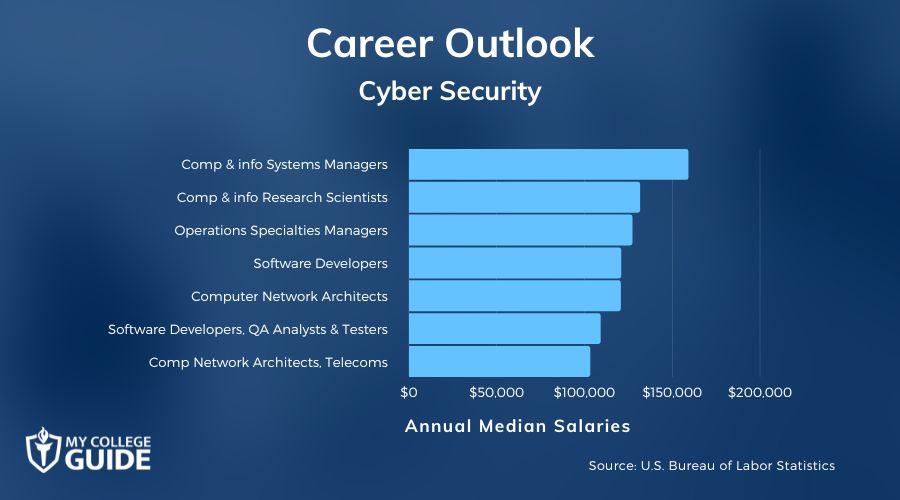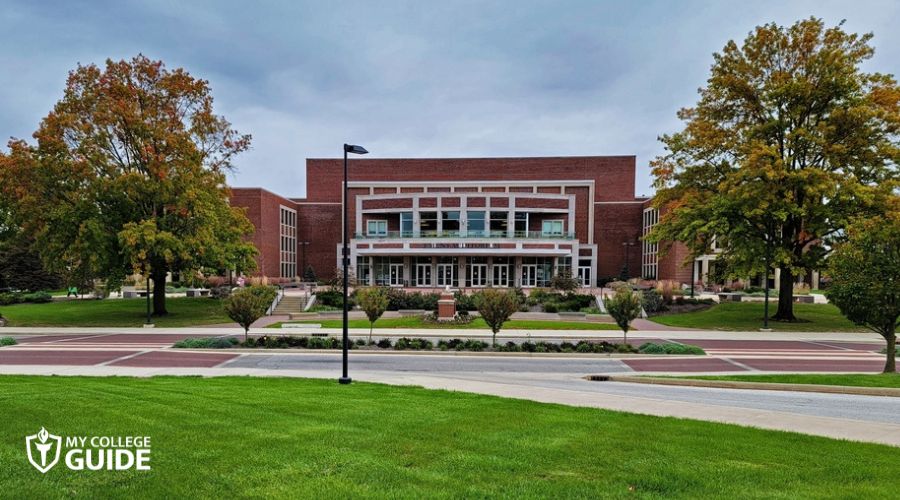Cyber security courses online are an excellent way to break into one of the fastest-growing industries. Cyber security involves protecting computer programs, systems, and networks from digital attacks. These attacks are usually meant to access, change or destroy sensitive information, steal money, or interrupt business. These attacks threaten individuals and businesses alike.

The rapid expansion of e-commerce, global trade, and digital communication has resulted in more frequent and innovative attacks. It’s imperative that companies find skilled cyber security specialists who can build complex defenses, retrieve stolen assets and track down the attackers.
Editorial Listing ShortCode:
Cyber security is an excellent choice for those seeking a secure, lucrative, and exciting career.
Online Bachelors in Cyber Security Degrees

Students interested in bachelor in cyber security online degrees may find numerous opportunities in a rapidly growing field.
As more information in nearly every industry is stored digitally, the demand for cybersecurity professionals with the skills to protect and restore digital assets continues to increase. Students who earn their online cybersecurity degrees tend to be strong in critical thinking, analysis, problem-solving, communication, and attention to detail.
Editorial Listing ShortCode:
The field of cybersecurity is ever-changing. Professionals must keep up with technological advances to provide the highest level of security and successfully monitor digital threats. Students working toward their bachelors degree in cyber security online may find topics that include:
- Programming
- Networking
- Digital forensics
- I.T. foundations
- Cryptography
- Legal and Ethical issues
- Scripting
- Cyber defense and countermeasures
Students may take courses in Managing Cloud Security, Data Management, the Business of I.T., and Information Systems Security.
Students may find that some cyber security schools online offer concentrations that they can choose from, including computer forensics and cybercrime and fraud investigation. Careers in cybersecurity are growing, tend to pay above-average salaries, and include jobs like Information Security Analysts and Computer and Information Systems Managers.
Graduates can find employment opportunities with various government agencies, businesses in every industry, educational institutions, and nonprofit organizations.
Common Online Cyber Security Bachelor’s Degree Concentrations

The best cyber security school or program is one that offers the area of concentration that interests you, is accredited, and fits your schedule and budget. But rest assured, cyber security training courses are fairly standard from school to school.
You will cover the foundation and principles of cyber security, investigating sources and communicating about threats, ethical hacking, and the current laws. Choosing an area of concentration is what will allow you to tailor your education.
Some popular areas of concentration include:
- Cloud Security
- Mobile application development
- Data Analytics
- Healthcare informatics
- Business intelligence
Look for a program that offers the concentration that will best prepare you for your future career. Your advanced coursework and capstone experience will center around this concentration, and make you especially marketable to future employers.
Cyber Security Careers and Salaries

A bachelor’s degree (or higher) in cyber security will allow you to pursue a number of in-demand, highly-paid careers. Here are some examples, taken from the U.S. Bureau of Labor Statistics:
| Careers | Annual Median Salaries |
| Computer and Information Systems Managers | $159,010 |
| Computer and Information Research Scientists | $131,490 |
| Operations Specialties Managers | $127,140 |
| Software Developers | $120,730 |
| Computer Network Architects | $120,520 |
| Software Developers, Quality Assurance Analysts, and Testers | $109,020 |
| Computer Network Architects, Telecommunications | $103,110 |
| Cyber Security Analysts | $102,600 |
| Database Administrators and Architects | $101,000 |
| Computer Programmers | $93,000 |
Depending on your degree and special coursework, you may also be qualified to pursue other IT positions, such as software developer, computer programmer, or information systems manager. Also, note that hard skills and experience are extremely valuable in this field and can help you earn promotions and salary increases over time.
Editorial Listing ShortCode:
In order to meet the demand of businesses, according to the BLS, the cyber security workforce, including information security analysts, is expected to grow 35% over the next 10 years.
Cyber Security Bachelor’s Curriculum & Courses

While courses will vary by school, listed below are some courses you may be expected to take to earn your bachelor’s degree in cyber security online.
- Cybersecurity Foundations: This course introduces students to fundamental cybersecurity terms, concepts, threats, and expert responses.
- Introduction to Scripting: Students are introduced to various programming concepts, including variables and loops, and how to develop simple scripts.
- Network Security: In this course, students will study common types of attacks on virtual systems and networks, strategies for defeating them, and protecting network systems.
- Digital Forensics in Cybersecurity: Students will learn to recognize cyber-attacks, find and analyze evidence, and identify consequences using security laws.
- Application Security: This course introduces the fundamentals of application security, including common vulnerabilities, strategies for prevention, and reduction of their impact.
- Cyber Defense: In this course, students will learn common protection strategies for networks, data, applications, and systems and explore new cybersecurity technology.
- Introduction to Cryptography: Students are introduced to fundamental skills in cryptography, cryptanalysis, and implementing encryption methods.
- Security Risk Management: Students will learn how to solve cybersecurity problems by understanding and applying essential risk management principles.
- Cyber Defense and Countermeasures: Students will develop the essential skills for handling and responding to cyber security threats in an information system.
- Managing Cloud Security: This course introduces students to safeguarding cloud data and applications, including risk analysis and management.
In addition to the courses listed above, most cyber security schools online will require completing general education requirements, including English, math, and science courses.
How to Choose an Online Cybersecurity Bachelor’s Degree Program

As you explore Bachelor of Cyber Security degrees online, there are various factors you can take into account to help you find the best program for you.
- Accreditation: A school’s accreditation status is a high priority for many students since it can potentially affect their education and employment opportunities.
- Schedule: Whether you are a full-time student or a working professional also taking courses, having a course schedule that works for you is key.
- Program Format: Part of course scheduling is knowing the program format and whether courses have set meeting times or if you can complete work on your schedule.
- Curriculum and Concentrations: Looking into a program’s courses and potential concentrations can help ensure your degree aligns with your career goals.
- Cost: The cost of online cybersecurity degrees varies, making it worth looking into programs that work with your budget or offer potential financial aid.
- Location: A school’s location may be a factor if there are on-campus requirements and potentially affect the cost of your program.
- Support Services: Many schools offer support for online students, so comparing what support is important to you and what each program offers can be helpful.
As you consider these factors for cyber security schools online, it may be helpful to rank them in order of importance to you individually.
Admissions Requirements

While admissions criteria will vary between cyber security schools online, listed below are some common requirements you may need for admission.
- Official Transcripts: Most programs will require official transcripts of your high school courses and any college-level courses.
- Minimum G.P.A. in S.T.E.M. courses: Some programs may require you to have earned a certain grade or G.P.A. in any prior S.T.E.M. courses, particularly advanced math.
- Resume: Some programs may require a copy of your resume, including any related work experience, education achievements, and volunteer work.
In addition, most programs will require submitting an application and possibly paying an application fee.
Online Cyber Security Degrees Accreditation

One important factor when deciding where to earn your bachelors degree in cyber security online is a school’s accreditation status. Schools that are regionally accredited are the most highly regarded since their programs have been verified as meeting agreed-upon educational standards.
Accreditation may affect your education if you decide to pursue additional degrees or transfer schools; many schools only accept degrees and credits from other accredited schools. A school’s accreditation may also affect your employment opportunities since employers may place more emphasis on degrees earned from accredited institutions.
Editorial Listing ShortCode:
You can visit the Council for Higher Education Accreditation website to learn more about school accreditation.
Cyber Security Licensure and Certifications

There are a wide variety of certificate and certification opportunities available in the cyber security field. Cyber security certificate programs are offered at the undergraduate and graduate levels and involve completing a course or series of courses. These programs may last a few weeks or a few years.
The credits earned can sometimes be applied toward a future degree, or simply used to boost one’s resume. On the other hand, there are cyber security certifications that do not involve taking courses. These certifications can be awarded by professional organizations to those who prove they have mastered certain skills.
Some of the most popular and valuable options include:
- CompTIA Security+
- CompTIA Network+
- CompTIA PenTest+
- CompTIA Cybersecurity Analyst (CySA+)
- CompTIA Advanced Security Practitioner (CASP+)
- Certified Ethical Hacker (CEH)
- Certified Information Systems Security Professional (CISSP)
- Licensed Penetration Tester (LPT)
Typically certificates and certifications are not earned in lieu of a degree but as a supplement to a degree or significant work experience. They can show a current or potential employer that you are motivated to learn and have a specific area of interest or expertise that sets you apart from others. This sort of credential can help you land a job, promotion, or raise.
Cybersecurity Majors Financial Aid and Scholarships

As you look into BS in Cybersecurity online degrees and the associated tuition, it may be worth looking into options for financial aid and scholarships.
If you are employed in I.T., or if your employer has an unfulfilled need for cybersecurity skills, you may be eligible for tuition assistance or reduced tuition through your employer. You may also find scholarships available through individual schools or numerous public and private institutions.
Financial assistance may also be available through government loans or grants, including Pell Grants, which are usually reserved for undergraduate students.
You can learn more about Pell Grants and other potential financial assistance through the Federal Student Aid website.
Is Cybersecurity a Good Career?

Yes, cybersecurity is a good career for many professionals. Successful graduates can find employment opportunities in numerous career paths and industries.
Based on data from the Bureau of Labor Statistics, many careers in this field pay higher-than-average salaries, with some expected to experience double-digit job growth. Careers like Computer and Information Systems Managers are projected to grow 16 percent over the next 10 years.
As individuals and industries continue to rely on technology to store data and information, there will always be a need for individuals who can help protect and restore this information.
What Degree Do You Need for Cyber Security?

Most corporations hiring cyber security professionals are looking for candidates who hold a bachelor’s degree in cyber security, computer science, or a related field.
You may notice cyber security programs are available as Bachelor of Science (BS) or Bachelor of Applied Science (BAS) degrees. Either degree program is appropriate, but there are slight differences between the two.
A BS degree will explore the technical and theoretical sides of the discipline and is an especially good option for those who plan to pursue graduate-level education. A BAS, on the other hand, is more focused on the technical aspects of the field and preparing students for immediate entry into the workforce.
Editorial Listing ShortCode:
If you are interested in seeking a more advanced position such as chief information security officer or security director, and/or you want to lead a security team early in your career, you will likely need a master’s degree in cyber security. It may be possible to secure entry-level employment with some relevant experience or a certificate, but the vast majority of employers are seeking candidates with at least a bachelor’s degree.
A bachelor’s degree program will include foundational courses, as well as opportunities to gain specialized training in an area of particular interest to you. This degree will show employers you have the skills necessary to provide top-notch security for their business.
What is a Cyber Security Bachelor Degree?

A cyber security bachelor degree is a program that prepares students for careers protecting digital assets from cyber-attacks. In earning bachelor in cyber security online degrees, students develop a thorough understanding of computers, systems, networks, and databases.
Building on their understanding of this infrastructure, students learn how to identify potential weaknesses in an organization’s computing system and reinforce security where needed. Students also learn to respond to cyber-attacks and restore protection in the event of an incident.
Successful graduates pursue cybersecurity careers in almost every industry, including private companies and government institutions, helping maintain infrastructure security.
Is Cybersecurity a Hard Major?

Whether or not cybersecurity is a hard major will vary based on each individual, with topics including networking, scripting, programming, and cryptography.
Students will learn the fundamentals of Information Technology (I.T.), including computer components, data storage, operating systems, and troubleshooting basic computer issues. Other essential topics include scripting and programming, including being able to write basic scripts and programming in program languages like Python.
Students will also need critical thinking and problem-solving skills as they study risk management, incident response, and legal factors within cybersecurity.
Does Cybersecurity Require Coding?

While most jobs in cyber security do not require any knowledge of coding, and cyber security university courses don’t generally include it in the curriculum, some programming know-how would be very beneficial, especially when it comes to advancing in the field.
A basic understanding of programming languages will allow you to develop attack simulations, build intrusion detection systems, and scan networks for vulnerability without having to outsource these parts of the job.
What Can You Do With a Cyber Security Degree?

Successful graduates with B.S. in Cybersecurity online degrees can find opportunities for employment in almost every industry.
Private companies, government agencies, education institutions, and nonprofit organizations are a few examples of entities that need to ensure their information is secure. Information Security Analysts, one of the fastest-growing careers in this field, implement security measures to protect computer networks and systems.
Graduates also find employment as Computer and Information Systems Managers, Database Administrators, and Network and Computer Systems Administrators. Professionals can also expand their career options through work experience, additional education, and professional certifications.
What Does a Cyber Security Analyst Do?

While the exact responsibilities of a cyber security analyst vary, the fundamental responsibility is to protect data and information and develop a response in the event of a cyber attack.
Security analysts need a thorough understanding of the I.T. infrastructure to protect an organization’s information and to make security improvements where needed. Another essential responsibility is to test the security system for weaknesses, potentially finding and correcting weak spots in security before they are compromised externally.
Editorial Listing ShortCode:
Cybersecurity analysts use their knowledge of the existing system and potential weaknesses to enhance security, including additional security software and password protection.
Is Cyber Security a Stressful Job?

The level of stress really depends on your role. Individuals on the front lines facing a data breach will likely endure a significant amount of stress, but someone in charge of training or communicating new policies may not face much stress at all.
Of course, stress levels fluctuate. Those who worked tirelessly to resolve a threat will later have periods of minimal stress, and vice versa. Regardless of the responsibilities and stress level, know that your role will be rewarding. Protecting a company or individual’s data from being compromised is important work and only those with the right skills and training can do it.
Can I Get a Cyber Security Degree Online?

Yes! There are many reputable, accredited institutions offering cyber security courses online so that you can earn your degree or certification without putting your life on hold. You can continue to care for your family and/or maintain your employment while taking classes at your convenience.
Online courses may also allow you to graduate faster. While a traditional bachelor’s degree takes around 4 years to complete, if you opt to learn cyber security through a program offering online degrees, you could graduate in as little as 2 years.
How Long Does it Take to Get a Bachelor’s in Cyber Security Degree Online?

The time needed to complete your bachelors degree in cyber security online will vary based on a few factors. If you take courses full-time and follow a traditional 16-week semester, it will take four years to complete your bachelor’s degree.
You may finish in less time if you are enrolled year-round, including summer sessions, and follow an 8-week semester. If you are taking courses on a part-time schedule, completing your degree will take longer.
What’s the Difference Between a Bachelors Degree in Cybersecurity vs. Computer Science?
While there is some overlap in the skills and knowledge of these degrees, there are key distinctions in focus and the associated careers.
| Bachelors in Cybersecurity | Bachelors in Computer Science |
|
|
While both degrees require understanding computers and information technology, cybersecurity is a type of computer science focused on protecting data and information.
What’s the Difference Between a Bachelor’s Degree in Cyber Security vs. Information Security?
While there is some overlap between cyber and information security, there are some essential distinctions between the two degrees.
| Bachelors in Cybersecurity | Bachelor’s in Information Security |
|
|
While both seek to protect the information, cyber security falls under the larger information security umbrella.
What’s the Difference Between Cyber Security vs. Software Engineering Majors?
While both majors can lead to in-demand careers that frequently work together, there are some basic differences between the two fields.
| Cyber Security Majors | Software Engineering Majors |
|
|
While there is overlap in some of their skills, these two branches work best in developing software and then ensuring that it is well-protected.
Is an Online Degree in Cyber Security Worth It?

Yes, an online degree in cyber security is worth it for many students. Careers in this field are in high demand and tend to pay above-average salaries, with job growth projected to continue.
Careers like Information Security Analysts are projected to grow 35% over the next 10 years, much faster than most occupations. Graduates may also find numerous employment opportunities, with nearly every industry needing professionals to protect and secure their information.
Editorial Listing ShortCode:
As more information is created, stored, and managed digitally, the need for individuals with cybersecurity skills will only increase in the future.
Universities Offering Online Bachelors in Cybersecurity Degree Programs
Methodology: The following school list is in alphabetical order. To be included, a college or university must be regionally accredited and offer degree programs online or in a hybrid format.

U.S. News & World Report named Ball State University in the top 20 online bachelor’s programs in the country. The school offers a BS in Applied Cybersecurity. The program is entirely online, and courses are conducted in an asynchronous format. The program requires the completion of 120 credit hours, including an internship. Courses follow a regular semester schedule.
Ball State is accredited by the Higher Learning Commission.

Best Colleges ranked Bellevue University in their listing for Top 10 Best Online Cybercrime Programs. The school offers a BS in Cybersecurity. The program is available fully online and on campus and requires the completion of 127 credits. Courses follow a semester schedule, and students may take as many classes as they want per semester.
Bellevue University is accredited by the Higher Learning Commission.

California Baptist University offers a BS in Cybersecurity. This fully online program is taught through a Christian worldview. The program is designed for degree completion, and students are expected to meet general education requirements before applying. The program can potentially be completed in just 16 months.
California Baptist University is accredited by the Western Association of Schools and Colleges Senior College and University Commission.

U.S. News & World Report ranked Champlain College among the best schools in the country for online bachelor’s degrees. Champlain offers a BS in Cybersecurity that can be earned entirely online. The program requires the completion of 120 credit hours, and up to 90 qualifying credits. Courses are offered in an asynchronous format, and some are accelerated.
Champlain College is accredited by the New England Commission of Higher Education.

The City University of Seattle offers a BS in Cybersecurity. The program is fully online, with the option for on-campus classes. Classes are offered in quarter terms. The program requires the completion of 18 quarter credits, which can potentially be completed in just 2 years with qualifying transfer credits.
CityU is accredited by the Northwest Commission on Colleges and Universities.

Colorado State University offers a BS in Cybersecurity through its Global program. The degree is entirely online, and classes are offered in an asynchronous format. The program requires the completion of 120 credit hours. Courses are conducted in an 8 week, accelerated format, and there are start dates offered each month. Additional specializations, such as Healthcare Management and Marketing, are also available.
Colorado State University is accredited by the Higher Learning Commission.

Eastern Oregon University offers a BA, a BS, and a BAS in Cybersecurity. Courses are offered fully online. Students typically attend part-time and take two classes each 11 week term. Each degree requires the completion of 180 credit hours and can typically be completed in 4 years. Up to 135 qualifying credit hours may be transferred in.
Eastern Oregon University is accredited by the Northwest Commission on Colleges and Universities.

Excelsior University offers a BS in Cybersecurity with a Cyber Operations concentration. The program can be completed entirely online. It requires the completion of 120 credits, and up to 113 qualifying credits may be transferred in. Students may be able to earn credit for work and military experience as well.
Excelsior University is accredited by the Middle States Commission on Higher Education.

Grand Canyon University offers a BS in Cybersecurity. The program offers fully online and on-campus tracks. Online courses are 7 to 8 weeks long. The program requires the completion of 120 credits, and up to 90 credits may be transferred in. There are also options available to fast-track the degree.
Grand Canyon University is accredited by the Higher Learning Commission.

Herzing University offers a BS in Cybersecurity. The program is entirely online. Some classes meet asynchronously, with classes meeting in the afternoons or evenings. The program requires the completion of 120 credits, and up to 90 qualifying credits may be transferred in. Dual credit may also be earned toward an MBA. The program can potentially be completed in 32 months.
Herzing University is accredited by the Higher Learning Commission.

Hilbert College offers a BS in Cybersecurity. The program is entirely online and requires the completion of 120 credits. Up to 90 qualifying credits may be transferred in. Courses are offered in accelerated, 8 week blocks, and there are six start dates offered each year. The program can typically be completed in 4 years.
Hilbert College is accredited by the Middle States Commission on Higher Education.

Immaculata University offers a BS in Cybersecurity that can be completed fully online. The program requires the completion of 126 credits. Courses are taken one at a time in 7 week, accelerated sessions. The program can potentially be completed in just 3 years. Potential courses include Web Design Applications, IT Security Governance, and Cybersecurity Fundamentals.
Immaculata University is accredited by the Middle States Commission on Higher Education.

Indiana Wesleyan University offers a BS in Cybersecurity, Cyber Analyst that can be completed entirely online. The program requires the completion of 14 core courses, for a total of 42 credit hours. Courses are 5 to 8 weeks long, and there are multiple start dates offered throughout the year.
Indiana Wesleyan University is accredited by the Higher Learning Commission.

Kennesaw State University offers a BS in Cybersecurity that can be completed entirely online. Courses are 16 weeks long during the fall and spring semesters and 8 weeks long during the summer semester. Most courses are conducted in an asynchronous format. Courses with synchronous components are scheduled during the evenings.
Kennesaw State University is accredited by the Southern Association of Colleges and Schools Commission on Colleges.

Liberty University offers a BS in Computer Science Cybersecurity that can be earned entirely online. The program also offers optional internship opportunities that may be completed at approved local locations. The program requires the completion of 121 credit hours. Up to 75% of the credits may be transferred in, and credits may be awarded for work experience. Courses are 8 weeks long.
Liberty University is accredited by the Southern Association of Colleges and Schools Commission on Colleges.

Maryville University offers a BS in Cybersecurity. The program is entirely online, and hands-on experience is provided through virtual labs. Depending on transfer credits, the program can potentially be completed in 2.5 years. The program offers three tracks: General Cybersecurity, Defensive Cybersecurity, and Offensive Cybersecurity.
Maryville University is accredited by the Higher Learning Commission.

Norwich University offers a BS in Cybersecurity. All coursework can be completed online, but an optional residency on campus may be attended. The program offers a choice between two concentrations: Computer Forensics and Vulnerability Management or Information Warfare and Security Management. Courses are conducted in an accelerated format, and there are several start dates offered throughout the year.
Norwich University is accredited by the New England Commission of Higher Education.

Old Dominion University has been designated by the NSA as a National Center of Academic Excellence in Cyber Operations Fundamental.
Old Dominion University offers a BS in Cybersecurity that can be earned through a full degree program or through a degree completion program. Courses are fully online, with synchronous and asynchronous components. Classes follow a regular semester schedule. The program requires the completion of 120 credit hours.
Old Dominion University is accredited by the Southern Association of Colleges and Schools Commission on Colleges.

Purdue University offers a BS in Cybersecurity through its Global Learning program. Courses may be completed fully online, and each one is 10 weeks long. The program requires the completion of 120 semester credits. There are multiple start dates offered each year. High-performing students may be able to begin work on their master’s while completing their bachelor’s degree.
Purdue University is accredited by the Higher Learning Commission of the North Central Association of Colleges and Schools.

The NSA and DHS named Regent University a National Center of Academic Excellence in Cyber Defense. Regent offers a BS in Cybersecurity that can be earned online or on campus. The program requires the completion of at least 120 credit hours. The program offers a state-of-the-art cyber range. Potential courses include Contingency Planning and Disaster Recovery, Ethics for Computer Science, and Digital Forensics.
Regent University is accredited by the Southern Association of Colleges and Schools Commission on Colleges.

Robert Morris University offers a BS in Cybersecurity with a choice between Cybersecurity or Digital Forensics concentrations. It can be completed entirely online or on campus. The program requires the completion of 120 credit hours, including 51 credits in the cybersecurity core. Courses follow a semester schedule and can potentially be finished in 4 years.
Robert Morris University is accredited by the Middle States Commission on Higher Education.

Niche named Saint Leo University one of the best online colleges in the country. Saint Leo University offers a BS in Cybersecurity that can be earned online, on campus, or at one of the school’s learning centers. The program requires the completion of 120 credit hours and can typically be completed in 4 years. Each course is 8 weeks long.
Saint Leo University is accredited by the Southern Association of Colleges and Schools Commission on Colleges.

Southern New Hampshire University offers a BS in Cyber Security. Courses are fully online and conducted in an asynchronous format. The program offers virtual labs. The completion of 120 credits is required to graduate, and up to 90 qualifying credits may be transferred in. Courses are 8 weeks long, and six start dates are offered throughout the year.
SNHU is accredited by the New England Commission of Higher Education, Inc.

The State University of New York – Canton offers a BS in Cybersecurity. The program is available entirely online, but students are required to attend live virtual classes.
The program requires the completion of 123 credits, and courses follow a semester schedule. Credits may be earned for work experience. Potential courses include Ethical Hacking and Penetration Testing, Management Information Systems, and Cryptology in Theory and Practice.
SUNY Canton is accredited by the Middle States Commission on Higher Education.

The University of Maryland Global Campus offers a BS in Cybersecurity Technology. The program is fully online, with some hybrid class options available. The completion of 120 credits is required to graduate, and up to 90 qualifying credits may be transferred in. Courses are conducted in an accelerated format, with three fall and spring terms and two summer terms.
UMGC is accredited by the Middle States Commission on Higher Education.

EDsmart ranked the University of North Dakota as the ninth-best online university in the country. UND offers a BS in Cyber Security. All courses are fully online and conducted in an asynchronous format, following a regular semester schedule. The program requires the completion of 120 credit hours. Potential courses include Advanced Embedded Systems Design, Engineering Data Analysis, and Emerging Threats and Defenses.
The University of North Dakota is accredited by the Higher Learning Commission of the North Central Association of Colleges and Schools.

The University of Texas – San Antonio offers a BBA in Cyber Security. The program is fully online, and most coursework is completed asynchronously. Courses are 8 or 16 weeks long and are offered in the fall, spring, and summer. The degree can potentially be completed in just 8 terms.
The University of Texas at San Antonio is accredited by the Southern Association of Colleges and Schools Commission on Colleges.

Western Governors University has been designated a National Center of Academic Excellence for Cyber Defense. WGU offers a BS in Cybersecurity and Information Assurance. The program also has 15 certifications built into the program without adding time for completion. The program is fully online. Students pay flat-rate tuition for 6 month terms and can take as many courses as they want each term.
Western Governors University is accredited by the Northwest Commission on Colleges and Universities.

William Woods University offers a BS in Cybersecurity. Courses can be completed entirely online, and the required internship may be completed locally. The program requires the completion of 124 credit hours, including a capstone project.
The program offers accelerated classes, and there are six start dates offered each year. Potential courses include Digital Evidence and Forensic Investigations, Critical Infrastructures, and Cybersecurity and Internet Architecture.
William Woods University is accredited by the Higher Learning Commission.

Wilmington University offers a BS in Cybersecurity that can be completed online or on campus. The program requires the completion of 120 credits. Classes are conducted in an accelerated format, and there are start dates offered every 8 weeks. The program offers a Digital Forensic concentration and the opportunity to begin work on a master’s degree.
Wilmington University is accredited by the Middle States Commission on Higher Education.
Getting Your Bachelor’s in Cybersecurity Degree Online

Earning your bachelors degree in cyber security online can start you on a career path in an exciting and innovative field.
Cybersecurity professionals are critical to our safety as a society, protecting everything from our personal information to the digital infrastructure of banks and government agencies. With a variety of concentrations to choose from and job opportunities in every industry, you can likely pursue career opportunities that align with your interests.
If the idea of a career in the in-demand field of cybersecurity interests you, you can look into bachelor in cyber security online degrees from accredited schools.
